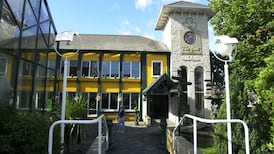Cairn Homes chief executive Michael Stanley has said there is "not a chance" of new house completions in Ireland bouncing to levels that meet demand by 2021, a decade and a half after the homebuilding market peaked.
“We’re hoping by 2021 we’ll be doing 1,500 units. If everybody else in the sector scales at the same pace as us, we’ll have gotten to 30,000. But I can’t see that happening,” Mr Stanley told reporters on Tuesday as Cairn reported that its gross profit rose to €26.1 million in the first half from €7.7 million a year earlier.
The view is at odds with a report published by global ratings agency Standard & Poor’s on Monday, which estimated new Irish home completions will match demand at about 35,000 units per year in three years’ time and lead to an easing in price inflation.
Goodbody Stockbrokers forecasts completions will reach 18,000 this year – compared with the 2006 peak of more than 90,000 – before rising to 25,000 by 2020.
Four years after Cairn was set up, the company is only now at a stage where it is completing and selling 800 homes a year. The group, which has used €720 million of equity raised since its June 2015 initial public offering to accumulate a land bank capable of delivering 14,500 houses and apartments, saw its number of closed home sales jump to 293 in the first half from 94 year on year.
As of September 3rd, total closed sales so far stood at 399, with forward sales amounting to 517.
Medium-term target
Cairn’s medium-term target of completing and selling 1,400-1,500 homes from 2021 marks an upgrade from its previous guidance of between 1,300 and 1,400 homes from 2020.
“The [industry] supply response will continue to take time,” said Mr Stanley, noting that developers are currently building office space to accommodate 60,000 workers in the Dublin city-centre business districts, while only about 1,000 apartments, capable of housing a maximum of 3,000 people, are under construction.
“It’s mind-blowing,” Mr Stanley said, adding that residential development in Dublin “is not as viable and profitable – and it hasn’t been for the last number of years – as office building”. However, he said recent building guidelines have helped make apartment building in the capital more viable.
Mr Stanley said Cairn will have raised up to €80 million between its inception and the end of this year from selling smaller, non-core sites. The company expects to start building next summer on the 8.64 acres of former RTÉ land at Donnybrook in Dublin 4, which it bought last year for €107.5 million. It hopes to get permission for “marginally” more than the 500 apartments and 10 houses previously earmarked for the site, the chief executive said.
Cairn Homes’s latest report showed its revenue increased to €130.2 million in the first half from €41.1 million for the same period last year. It will start to pay dividends out of 2019 profits that will be in line with industry norms, at 50-60 per cent of distributable income, company executives signalled.
Cairn also said that co-founder Alan McIntosh, a Scottish accountant and serial entrepreneur, has stepped down from an executive role at the company and is now moving to a non-executive board position.
The group is currently building on 13 sites, mainly in the greater Dublin area, and selling off nine developments. Its average selling price was €393,000 in the first half, up from €280,000 a year earlier, reflecting the fact that it sold more starter homes in early 2017.















